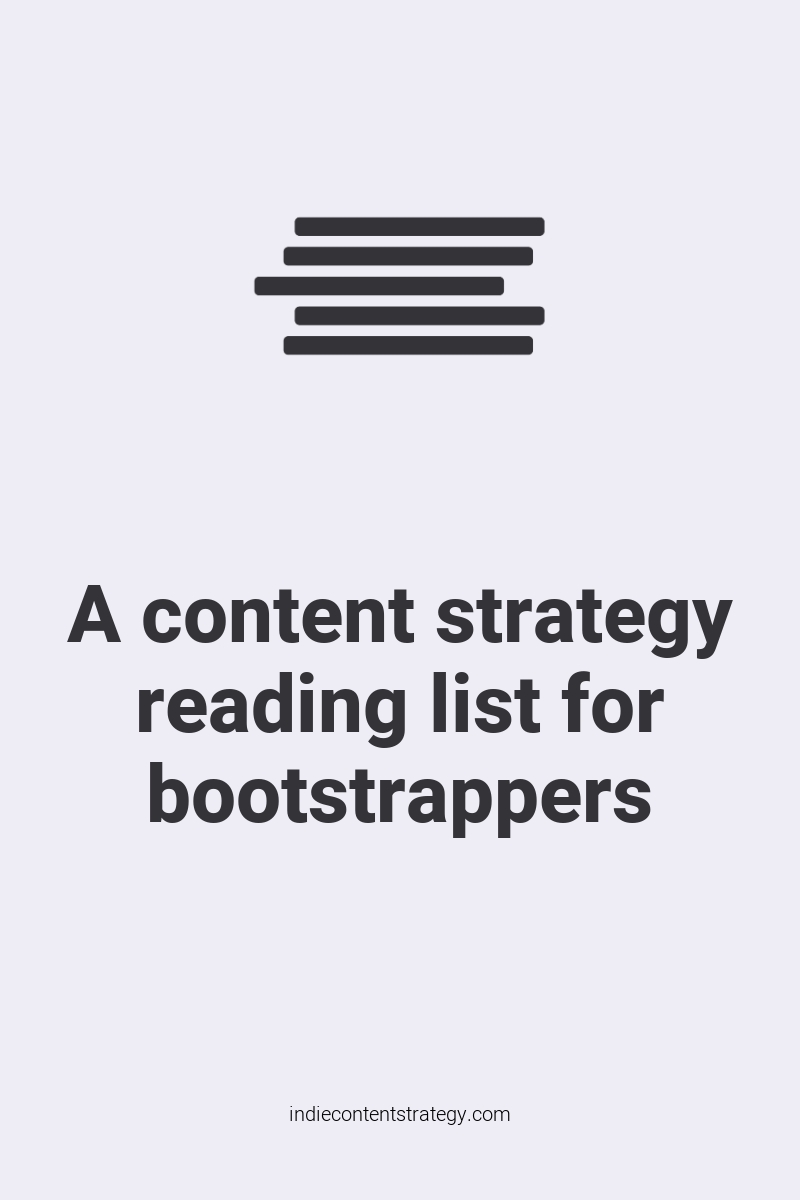It’s not easy to research everything you need to know about content strategy as a founder. I’ve collected the resources that helped me to connect the dots between building bootstrapped businesses and creating a content strategy.
A better starting point
When you start researching content strategy, you’ll get distracted by hundreds of „Ultimate Guides to Content Strategy“ cluttering Google, leaving you with little substance. There aren’t many dedicated (and useful) resources for content strategy for startups, even less so for bootstrapped companies of one.
I would know about that frustration: My solution was to dedicate 2 years of my life to studying content strategy and learn directly from industry professionals. Oh well! But this is my attempt to create a better starting point for you.
I’ll keep the list updated to add more precious finds.
Last updated: May 30, 2020
What is strategy, really?
Understanding what strategy is, and how business strategy and content strategy overlap has been one of the most important things for me. It helped me understand that these strategies don’t live alongside each other, but are sharing their fundamentals.
If you want to create a content strategy, you will inevitably get to the bottom of your business strategy as well. (Don’t let that scare you!)
- Playing to Win: How Strategy Really Works
by A.G. Lafley and Roger L. Martin
This book gives you a framework to understand how to define a strategy. It is kind of my holy grail, to be honest. - Minimum Viable Strategy: Winning in Business Inch by Inch
by John Childs
If you ask yourself how you can create strategy iteratively (as I do in my master thesis), this book has some answers. It also builds upon the framework from Playing to Win, so I think they go together very well. - Good Strategy, Bad Strategy: The Difference and Why It Matters
by Richard Rumelt
This book describes what strategy is, and what it isn’t. It helped me to spot if someone is bullshitting about strategy – one of the most valuable skills when researching it.
Content strategy intros
I haven’t got a lot of books on my shortlist that I would recommend you to read about the content strategy in general.
These books often include a lot about stakeholder alignment and how to sell content strategy as a consultant – they’re not written for you and me as indie founders. But they are valuable to get an understanding about what content strategy entails, of course.
- The Content Advantage: The Science of Succeeding at Digital Business through Effective Content
by Colleen Jones
I’m quoting Colleen Jones in every second article I write. This book is very closely connected to business strategy, and gives you a lot of material to work with as a small company. I’ve read it a few times already, and I’m always smiling and nodding along. - Content Strategy for the Web
by Kristina Halvorson & Melissa Rach
It’s the first one that I read about the topic, and I still think it gives a really valuable overview. It’s written from a consultant’s view, but it’s an enjoyable read, and gives you a solid foundation. As an addendum, take a look at the updated version of the Content Strategy Quad outlined in the book – a visualization of content strategy components. - The Content Strategy Toolkit: Methods, Guidelines, and Templates for Getting Content Right
by Meghan Casey
I’m not a fan of our fixation on tools. We tend to think that with the right tools, it will be easy to make the right decisions. Nonetheless, I understand that knowing the methods you can use is important to find your own way to create your strategy, so I include this book giving you an overview.
How businesses grow (with content)
Growth is a sensible topic for many bootstrapped businesses. While most of us strive for sustainable growth that doesn’t compromise how we want to live our lives, it is a necessity for businesses. A business without growth is a dying business.
Here are some resources that helped me shape my approach while resonating with my values.
- Product-led Growth: How to Build a Product That Sells Itself
by Wes Bush
If your desire for growth roots in the desire to bring more value to people, this book will help you create a framework to do so. I think it’s especially valuable for indie SaaS companies. But no matter what business you build, it gives you a lot to think about. If your product should sell itself, like the title proclaims, your content is a key element to communicate your its value and help people experience it. - HubSpot’s Flywheel
This is an alternative model for the dreaded funnel, and especially valuable for businesses that can’t and won’t just dump money into marketing. It’s a customer-first approach that shows you how making customers happy helps your business grow. It supports HubSpot’s Inbound Marketing approach, where content plays an important role.
Questioning growth for the sake of growth
As I think that topic is important, I’ll recommend some resources that help you reflect what kind of growth you want to 1) being able to shape your own life and 2) be responsible about the finite resources we have in this world.
I know this is not about content strategy per se, but these books helped me shape strategic decisions more than any specific strategy tool.
- Company of One: Why Staying Small Is the Next Big Thing for Business
by Paul Jarvis
Staying small as a deliberate choice: Paul Jarvis writes about how to lead businesses that align with your own values and goals. - Prosperity without Growth: Foundations for the Economy of Tomorrow
by Tim Jackson
This book helps you detach the term prosperity from money and economic success. It looks at the relationship between growth and our environment and societal problems, and shows an alternative way to make our economy more sustainable, as well as help people live a better life. - The Infinite Game: How Great Businesses Achieve Long-lasting Success
by Simon Sinek
Maybe you know Simon Sinek from his book and TED talk Start with Why. The infinite Game shows how to create a business in a world where we don’t have all the answers, and there is no final goal to anything. I think adopting an infinite mindset is a must for indie businesses who just want to deliver value to customers & society, and create a sustainable business.
Understand who you’re writing for
You need to understand your audience and how they think about the world to create a product that is useful for them. It’s just as important as a basis to decide how and where you can communicate to them.
- Practical Empathy: For Collaboration and Creativity in Your Work
by Indi Young
This book is about how to really listen to people, and I think everyone should read it – period. - Jobs to be Done
by Jim Kalbach
Jobs to be done help you to get to the core of your customer’s needs. What do people really want to achieve by using your product? Maybe they really want to impress their colleagues, rather than saving x amount of money. Learn how to find out. - Just Enough Research
by Erika Hall
This book helps you to integrate research into your work on your product, and shows it doesn’t take much to get valuable data. A very down to earth, practical guide. - The Mom Test: How to talk to customers & learn if your business is a good idea when everyone is lying to you
by Rob Fitzpatrick
How to ask the right questions to explore the pain points of your customers? - Mapping Experiences: A Complete Guide to Creating Value through Journeys, Blueprints, and Diagrams
by Jim Kalbach
This will help you get work through the jungle of research and customer insights, and build valuable services from it.
Finding your voice & positioning yourself
The groundwork of a content strategy is to know how to position yourself on the market, and defining how you want your customers to perceive you.
- Obviously Awesome: How to Nail Product Positioning so Customers Get It, Buy It, Love It
by April Dunford
April Dunford really cuts through all of the wishy-washy crap out there about positioning. This book gives you a repeatable, logical process for positioning. - Content Strategy at Work: Real-world Stories to Strengthen Every Interactive Project
by Margot Bloomstein
To get people trust you, you need to know who you are and communicate accordingly. Margot Bloomstein’s approach to message architecture gives you a solid process with actionable results to help you create cohesive content.
Analyzing content
To make strategic decisions about your content, you will need to know what content you have, and how it performs right now. One of the most important tools to do that are content audits.
You might find this boring as hell if you don’t love Excel sheets, but I promise you’ll discover a lot of insights about your content – even if you work with it every day and think you know it well!
- Content Audits and Inventories: A Handbook
by Paula Ladenburg Land
While audits are mentioned in almost any content strategy book, this is the real deal. It offers a complete process about how to define the criteria and set up your content audit to get the most insights.
Structuring content
Structuring content helps your audience relate to it, and makes it findable. How you organize your content and how you lead people through it is an art and science alike (and I quote this from the first book on the list 👇️).
- Information Architecture: For the Web and Beyond
by Louis Rosenfeld, Peter Morville & Jorge Arango
This book is a classic, and only referred to as The Polar Bear Book in information architecture circles. It’s not something you’ll excitedly read in bed before going to sleep, but it holds so so much value. - Everyday Information Architecture
by Lisa Maria Martin
If you want to read something a bit more conversational to get an intro, this is a very easy read. - The Accidental Taxonomist
by Heather Hedden
This book is so great to help you understand how to create reliable categorization systems for your content. Buckle in, as there is a lot of substance in there – but I promise it gives you actionable tools as well.
Creating content systems
As a bootstrapped company, being efficient in your content operations is important. If you want to make the most of your time, you’ll need to create repeatable systems and be smart about reusing your content.
These things tend to get more important as your business grows, but it pays off if you start with the basics early.
- The Content Advantage: The Science of Succeeding at Digital Business through Effective Content
by Colleen Jones
I also listed this book in the section about content strategy intros. Colleen Jones also writes about content operations, and how to build systems to keep measuring and optimizing your content. - Content Everywhere: Strategy and Structure for Future-Ready Content
by Sara Wachter-Boettcher
This is an exploration of how to create content that can do more. How to make it ready to be reusable and more manageable? It’s a great read, and not anchored in the realms of enterprise content strategy. - Designing Connected Content: Plan and Model Digital Products for Today and Tomorrow
by Carrie Hane & Mike Atherton
This book gives you a structured process on how to create content that can flexibly go anywhere. But I think it’s even more valuable for your business, as it helps you explore the problem space / domain you’re in with fresh eyes, and see how concepts are connected. - The coming of age of ContentOps
by Rahel Bailie on the GatherContent Blog
This is a transcript of a webinar by Rahel Bailie, talking about the basics of Content Operations, and what a system really is.
Writing better content
- Nicely Said: Writing for the Web with Style and Purpose
by Nicole Fenton & Kate Kiefer Lee
I have no words for this book other than delightful. It’s beautifully written, and an easy and informative read. - On Writing Well: The Classic Guide to Writing Nonfiction
This classic shows you the fundamentals of the craft of writing. I found it especially valuable as a non-native speaker of the english language.
Writing consistently
I wrote about why I think that we need to develop good content habits before. These are the two books that helped me do that (and also create a healthier life in general)
- Atomic Habits: An Easy & Proven Way to Build Good Habits & Break Bad Ones
by James Clear - The Power of Habit: Why We Do What We Do in Life and Business
by Charles Duhigg
SEO – Optimizing content for search
Honestly, I’m not an expert on SEO – but I’ve dug through too many clickbait-y SEO advice articles to count. These two resources are no bullshit, by people I really respect in that space.
- Understanding SEO
by Franz Enzenhofer - Detailed Blog
by Glen Allsopp
(We actually also bought the accompanying course SEO Blueprint.)
I know this is a pretty wide range of topics and books, and it can feel quite overwhelming at first. Content strategy is integrated with every part of your business, so all of these puzzle pieces influence it.
You definitely won’t regret digging down that rabbit hole.



